Cocoa is a key raw material for chocolate, confectionery, bakery, and even cosmetic industries. It’s one of the world’s most traded agricultural commodities, linking farmers, processors, exporters, and food brands across continents. As global awareness grows around sustainability, food safety, and ethical sourcing, demand for certified cocoa has increased dramatically.
Businesses today no longer look for just “any cocoa supplier.” They seek trusted EU-certified cocoa suppliers, USDA-certified cocoa suppliers, and Halal-certified cocoa exporters who can provide full assurance that their products meet strict international standards. These certifications are not merely badges of compliance; they are indicators of quality, traceability, and integrity — values that drive modern food production.
From cocoa beans to cocoa powder, cocoa butter, cocoa mass, and alkalized cocoa powder, certification plays a major role in defining the value and marketability of each derivative. It also determines which markets the products can enter, from the European Union to the United States and regions with Halal compliance requirements.
Importance of Certifications (EU, USDA Organic, and HALAL)
In the international cocoa trade, certification is the bridge between trust and trade. It’s not just a label—it’s proof of compliance, sustainability, and integrity. For buyers across Europe, North America, and the Middle East, certifications like EU Organic, USDA Organic, and HALAL assure that the cocoa and its derivatives meet stringent production and quality standards.
EU Organic Certification
The EU Organic certification is one of the most respected standards for agricultural products entering European markets. It ensures that cocoa has been cultivated and processed without synthetic pesticides, chemical fertilizers, or genetically modified organisms (GMOs).
To achieve this certification, producers and exporters must comply with strict guidelines set by the European Commission, including soil management, crop rotation, and environmentally friendly pest control.
For cocoa suppliers, this certification means access to one of the world’s largest organic markets, where consumers are highly conscious about food origin, purity, and sustainability. It also enhances traceability; each batch can be traced back to its farm of origin.
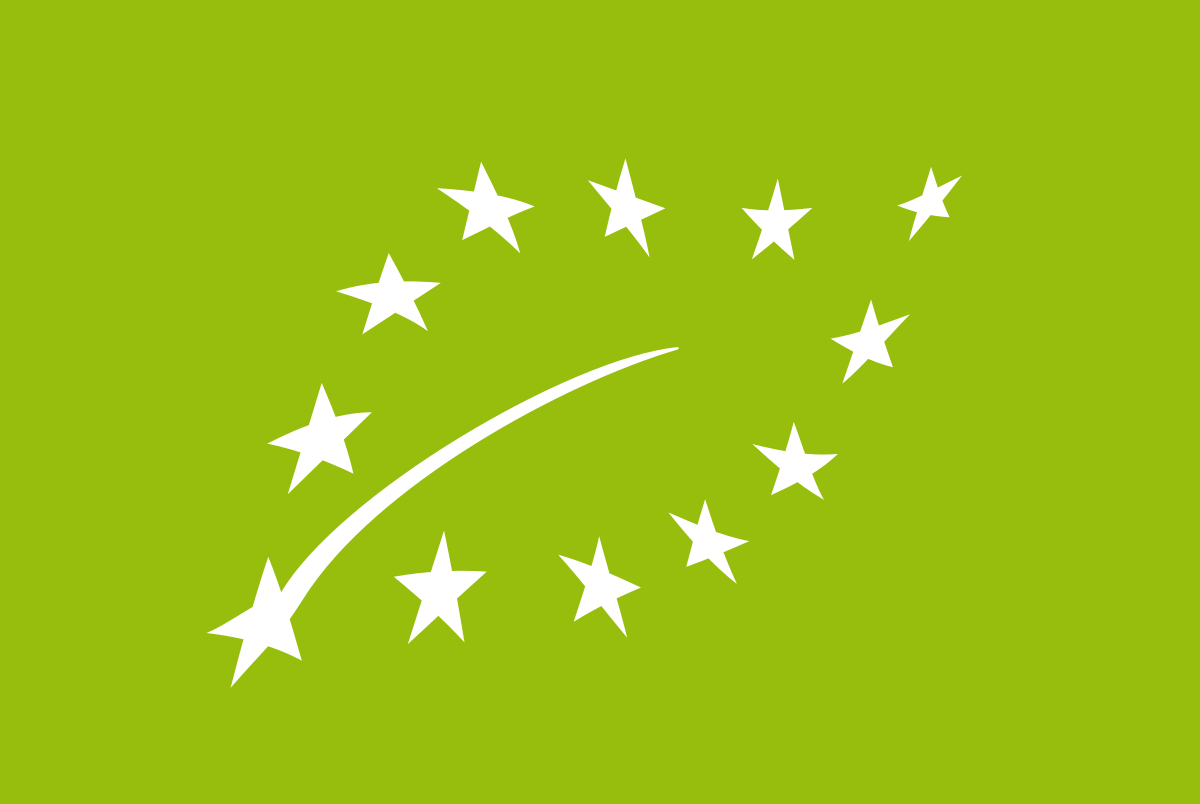
USDA Organic Certification
The USDA Organic certification, administered by the United States Department of Agriculture, has similar principles to the EU’s framework but is tailored to American standards. For cocoa to qualify, it must be produced under conditions that maintain ecological balance, protect biodiversity, and avoid synthetic chemicals at every stage, from soil preparation to packaging.
For buyers in North America, the USDA Organic seal is a guarantee of authenticity. It provides confidence that the product is free from residues, harmful processing agents, and artificial additives.
Suppliers holding both EU and USDA Organic certifications have a clear advantage; they can trade freely in two of the most demanding organic markets in the world, widening their reach and competitiveness.

HALAL Certification
While organic certifications ensure environmental and agricultural integrity, HALAL certification assures religious compliance. HALAL-certified cocoa and derivatives conform to Islamic dietary laws, meaning they are free from any substances or processes that are forbidden (haram).
This certification is especially significant for markets across the Middle East, Southeast Asia, and parts of Africa, where HALAL compliance is a prerequisite for many food and cosmetic products. It covers every stage of processing, ensuring cleanliness, traceability, and adherence to ethical handling and production.
Why are Certifications important for Buyers and Exporters?
Certifications have become a key factor in global trade negotiations. For buyers, they simplify due diligence and ensure consistent product quality. For exporters, they enhance reputation, build credibility, and open access to premium markets.
Certified cocoa suppliers, like Radad International, undergo periodic audits and inspections to maintain their status. This ensures that each shipment consistently meets international standards, helping global brands maintain product integrity from bean to finished product.
Cocoa Supply Chain and the Role of Certified African Exporters
The journey of cocoa from farm to finished product is long, intricate, and deeply dependent on the integrity of its supply chain. At every stage, from cultivation and fermentation to processing and export, maintaining quality and certification standards is vital. This is especially true for cocoa destined for EU and USDA Organic markets, where traceability and ethical sourcing are non-negotiable.
The Cocoa Supply Chain at a Glance
The cocoa supply chain begins with smallholder farmers, most of whom are based in West Africa, a region responsible for more than 70% of the world’s cocoa production. After harvesting, the beans undergo fermentation and drying, critical steps that determine flavor, aroma, and color.
Once processed, the beans are transported to local exporters, who ensure that only the finest, certified batches move forward. These are then shipped to international processors and manufacturers, who convert them into cocoa derivatives such as cocoa butter, cocoa powder, nibs, and cocoa mass.
For EU and USDA Organic certified supply chains, documentation and traceability are crucial. Each shipment must have a clear record of its origin, organic farming practices, and compliance with environmental and labor standards.
The Role of Certified African Exporters
Certified African cocoa exporters play a critical role in connecting local farming communities with international markets. These exporters act as both quality controllers and advocates for sustainable trade.
They ensure that the cocoa is:
- Cultivated organically, without synthetic chemicals or fertilizers.
- Processed in hygienic, certified facilities that meet international food safety requirements.
- Stored and transported under optimal conditions to preserve quality and prevent contamination.
By holding certifications like EU Organic, USDA Organic, and HALAL, African exporters demonstrate their commitment to excellence and transparency. This gives international buyers confidence that they’re sourcing from responsible, compliant suppliers.
Empowering Local Farmers through Certification
Certifications are not just stamps of approval; they are pathways to empowerment for farming communities. Farmers trained under organic and HALAL standards gain knowledge about sustainable agriculture, soil preservation, and waste reduction.
This improves not only their yields but also the long-term health of their farms. Exporters who invest in training and certification support help build resilient, self-sustaining supply networks that benefit both producers and buyers.
Quality Assurance and Post-Harvest Practices
Maintaining quality post-harvest is as important as the farming itself. Certified suppliers enforce strict monitoring from the moment beans are harvested. Temperature, humidity, and storage methods are closely controlled to maintain natural flavors and prevent mold growth.
Processing facilities used by certified exporters often include state-of-the-art equipment for cleaning, roasting, grinding, and packaging, ensuring that each derivative product, such as alkalized cocoa powder or cocoa butter, meets exacting international standards.
Radad International collaborates closely with certified African cocoa exporters who comply with EU, USDA Organic, and HALAL standards. By doing so, the company ensures a consistent supply of premium-quality cocoa and its derivatives, including cocoa beans, powder, butter, and mass, to global markets.
Radad’s partnerships are built on transparency, sustainability, and shared commitment to excellence, ensuring that every product supplied aligns with international certification and ethical sourcing requirements.
Range of Cocoa Products and Their Applications
Cocoa is far more than just the main ingredient in chocolate. It is a versatile commodity with diverse applications across industries, from food and beverages to cosmetics, pharmaceuticals, and even wellness products. Certified suppliers ensure that every derivative, from cocoa beans to cocoa butter, meets the high standards demanded by these sectors.
Cocoa Beans
Cocoa beans are the foundation of every cocoa-based product. Harvested from the pods of the cacao tree, these beans undergo careful fermentation and drying to develop their characteristic flavor profile.
EU and USDA Organic certified cocoa beans are cultivated using natural farming methods that respect both the environment and the integrity of the crop. Such beans are prized for their purity, traceability, and consistent quality, qualities essential for premium chocolate and confectionery production.
Cocoa Powder
Cocoa powder is produced by grinding the roasted cocoa mass and removing most of its cocoa butter. It is widely used in baking, beverages, and desserts.
Certified suppliers often produce both natural and alkalized cocoa powder.
- Natural cocoa powder retains the raw flavor and acidity of the cocoa bean.
- Alkalized (Dutch-processed) cocoa powder is treated to reduce acidity and enhance color and solubility.
When sourced from EU and USDA Organic certified suppliers, alkalized cocoa powder is made using approved organic agents, ensuring it remains safe and compliant for organic production.
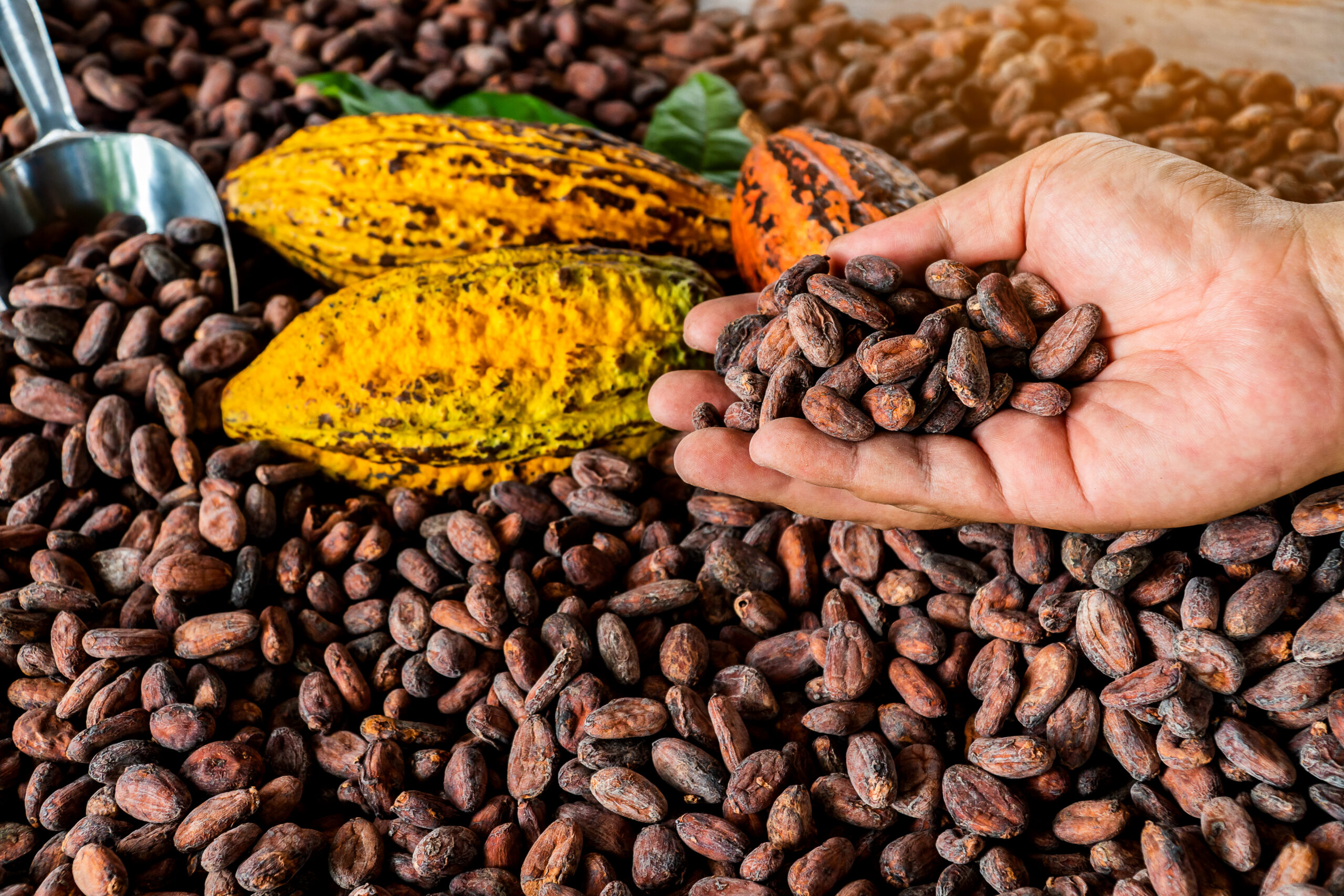
Reliable and trusted cocoa beans suppliers and exporters
Cocoa Mass (Liquor)
Cocoa mass or cocoa liquor is produced by grinding roasted cocoa nibs into a smooth paste. It contains both non-fat cocoa solids and cocoa butter, making it the base ingredient for chocolate manufacturing.
Its quality is largely influenced by the fermentation process and bean origin. Certified suppliers maintain strict quality control to ensure consistent texture, aroma, and purity, meeting international standards for chocolate producers.
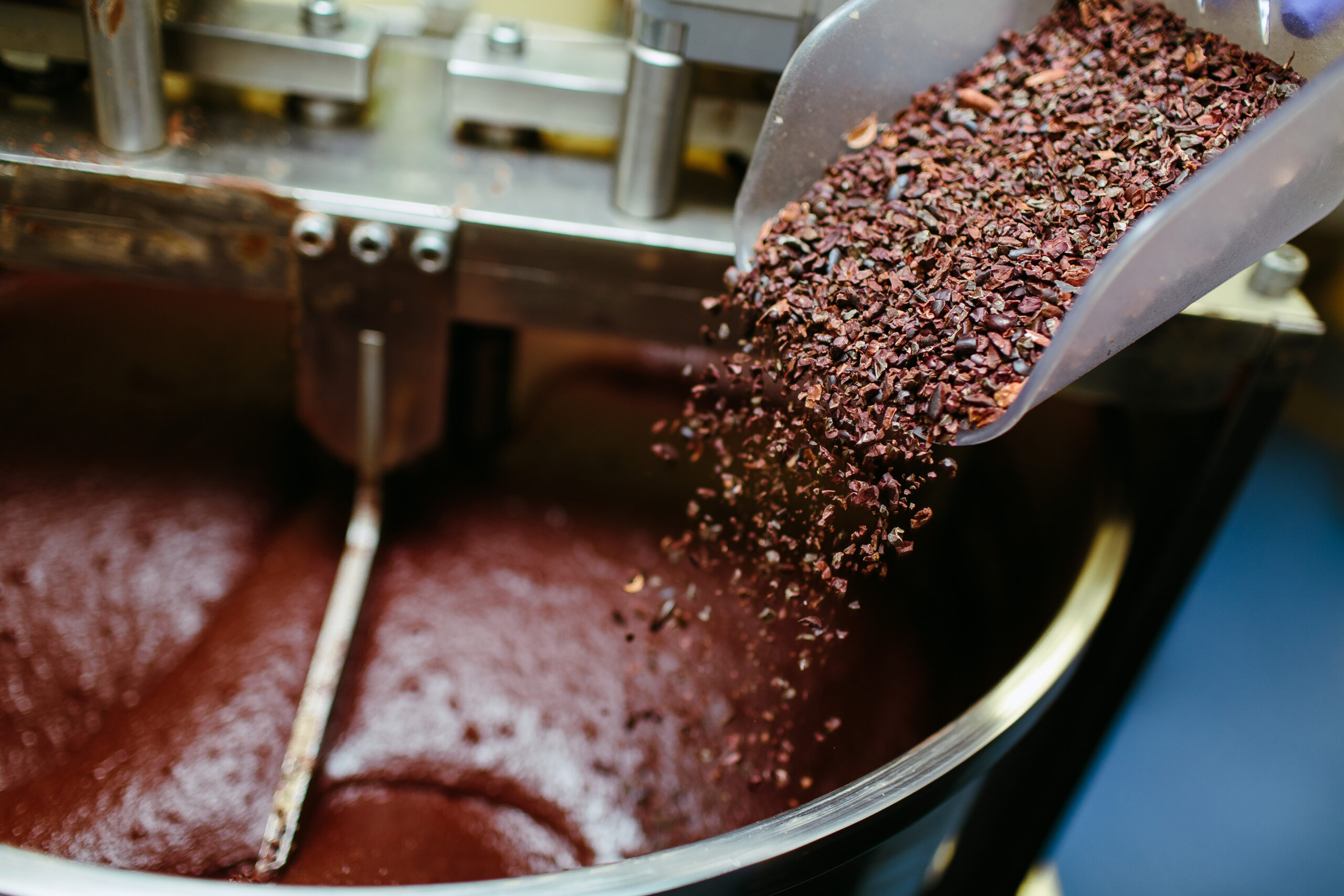
Cocoa Butter
Cocoa butter is a pale-yellow fat extracted from cocoa beans. It’s one of the most valuable cocoa derivatives due to its smooth texture, pleasant fragrance, and stability.
In addition to its central role in chocolate production, cocoa butter is used extensively in cosmetics, skincare, and pharmaceuticals.
HALAL and organic certification are particularly important for cocoa butter, as these products often go into personal care items that require ethical and safety assurances.
Cocoa Nibs
Cocoa nibs are small pieces of crushed cocoa beans that have been fermented, dried, and roasted. They are increasingly popular in the health food market due to their nutritional value.
Rich in antioxidants and natural flavor, organic cocoa nibs are used in snack mixes, granola, smoothies, and as toppings for baked goods. Certified nibs assure consumers of purity, non-contamination, and natural processing.

Cocoa Cake
After cocoa butter is extracted, the remaining solid material is known as cocoa cake. It is typically pulverized into cocoa powder but is also used as a flavor enhancer and in beverage mixes.
From a production standpoint, cocoa cake reflects efficiency — ensuring minimal waste in the cocoa supply chain. Certified suppliers process it under hygienic, eco-friendly conditions, contributing to a sustainable production cycle.
Cocoa Shells
While cocoa shells are often seen as by-products, their value has grown significantly in recent years. They are used in garden mulch, animal feed, natural dyes, and even sustainable packaging materials.
Some innovative food producers also utilize cocoa shell extracts for their antioxidant properties. Certified suppliers ensure these shells are processed responsibly, with minimal environmental impact.
Importance of Working with Certified Cocoa Suppliers
Choosing a certified cocoa supplier isn’t just a procurement decision; it’s a strategic move that impacts product quality, brand reputation, and market access. In an era where transparency and sustainability define business success, partnering with EU, USDA Organic, and HALAL certified cocoa suppliers offers both assurance and a competitive advantage.
Guaranteed Quality and Consistency
Certified cocoa suppliers operate under strict production and quality management systems. This ensures consistency in flavor, texture, color, and purity across every batch of cocoa and its derivatives.
For industries like food manufacturing and cosmetics, consistency is non-negotiable. The controlled processes and traceability protocols of certified suppliers guarantee that buyers receive the same quality every time, regardless of shipment size or origin.
Compliance with International Standards
The EU, USDA Organic, and HALAL certifications represent some of the world’s most rigorous compliance systems. Working with certified suppliers ensures that all cocoa products meet international food safety and labeling standards.
This simplifies regulatory approvals, reduces the risk of import rejections, and enables seamless access to demanding markets like the EU, the United States, and the Middle East.
For manufacturers that export finished goods, sourcing certified ingredients also supports compliance with their own export regulations, a crucial factor in maintaining a smooth global supply chain.
Access to Premium Markets
Globally, consumer demand for organic and ethically sourced cocoa continues to rise. Supermarkets, bakeries, and confectionery brands increasingly favor suppliers who can demonstrate credible certifications. Working with certified cocoa exporters opens doors to these premium markets, where buyers are willing to pay more for products that align with sustainability and quality values. This not only increases profitability but also strengthens brand positioning in the global market.
Transparency and Traceability
Traceability is a cornerstone of certification systems. Certified cocoa suppliers document every stage of production, from the origin of the beans to post-harvest handling, processing, and final shipment.
This full visibility allows buyers to verify the authenticity of their products and assure end consumers of ethical sourcing practices. For brands, this transparency translates to trust and long-term customer loyalty.
Ethical and Sustainable Sourcing
Certified suppliers promote more than product excellence — they support environmental stewardship and fair trade. Organic and HALAL standards require
environmentally responsible farming practices, reduced chemical use, and respect for local ecosystems.
For buyers and manufacturers, sourcing from such suppliers means contributing to a more sustainable cocoa economy while meeting the growing consumer demand for responsibly sourced ingredients.
Risk Reduction and Brand Protection
The global food and cosmetics industries are increasingly scrutinized for sourcing ethics and product integrity. Working with certified suppliers minimizes risks associated with contamination, mislabeling, and unethical production.
Certifications serve as an independent verification of quality and compliance, protecting both the buyer’s brand and reputation. When issues arise, detailed traceability records allow for swift action, ensuring minimal disruption to business operations.
Technical Support and Expertise
Many certified cocoa suppliers, including those affiliated with Radad International, offer technical guidance on cocoa applications, product formulation, and compliance requirements.
This expert support helps buyers choose the right cocoa derivatives for their specific needs, whether it’s high-fat cocoa powder for premium chocolate or low-acid cocoa butter for skincare formulations.
Working with such partners transforms the supplier relationship into a long-term collaboration, driven by shared quality and innovation goals.
Strengthened Brand Reputation
Consumers today care deeply about where their products come from. Partnering with certified suppliers allows businesses to confidently display “organic,” “HALAL,” and “ethically sourced” labels, qualities that build credibility and brand loyalty.
For international buyers, these certifications signal reliability and care, a direct reflection of their own brand values and commitment to excellence.
Radad International works closely with a network of EU, USDA Organic, and HALAL certified cocoa exporters across Africa. Through these partnerships, we ensures the consistent supply of premium-quality cocoa beans and derivatives like cocoa powder, cocoa butter, and alkalized cocoa powder.
By prioritizing sustainability, compliance, and customer satisfaction, Radad International provides global buyers with not only certified cocoa products but also peace of mind, knowing that their supply chain is ethical, transparent, and dependable.

What to Look for in a Certified Cocoa Supplier
When choosing a supplier of certified cocoa — whether cocoa beans, cocoa powder, alkalised cocoa powder, cocoa mass, cocoa butter, cocoa nibs, cocoa shells or cocoa cake — keep these key criteria in mind:
Documentation & Certification
Ask to see the organic certificate (EU/USDA), the Halal certificate, and any other quality or sustainable sourcing certificate (such as Fair Trade, Rainforest Alliance). The supplier should provide traceability back to the farm or cooperative.
Origin and Exporter Credentials
Many of the best cocoa origins are in West Africa (Côte d’Ivoire, Ghana, Cameroon) and Central Africa. If you want “African cocoa exporters”, or more specifically “EU-certified African cocoa exporters”, you’ll want a supplier with presence or partnerships in those regions, and proper export infrastructure.
Range of Derivatives
If your application is chocolate manufacturing, you might need cocoa beans, cocoa mass/liquor, cocoa butter and cocoa powder. If you are in bakery, maybe cocoa powder or alkalised cocoa powder suffice. Verify the supplier has the full range (beans, powder, mass, nibs, shells, cake).
Quality and Processing
For powders, check whether they are natural or alkalised (also called “Dutched”). Alkalised cocoa powder often has darker colour and milder acidity, which matters for taste and baking. If you seek “EU and USDA-Organic certified alkalised cocoa powder”, confirm the process and certifications cover the alkalising stage.
Halal Compliance
Ensure Halal certification covers storage, processing, packaging and shipping. Cross-contamination risks can invalidate Halal status.
Supply Chain Transparency
Traceable sourcing from farm to shipment helps verify organic and sustainability claims. Certifications aside, transparency builds trust.
Logistics and Export Support
If you import into EU or U.S., you’ll want a supplier who understands export documentation, customs, and storage conditions. Also check that the supplier handles cocoa derivatives like cake or shells if you need by-products.
Ethical & Sustainable Farming
Many buyers now require cocoa from sustainable farms (no child labour, deforestation-free, fair pay). This aligns with certifications and also with brand reputation.
Why These Certifications Translate to Market Advantage
Buying certified cocoa isn’t just about compliance — it often translates into market opportunities and trust.
- Organic certified cocoa (EU/USDA) allows access to premium markets, higher price points and specialty brands.
- Halal certified cocoa opens access to large Muslim consumer markets in Middle East, Asia, and beyond.
- Certified derivatives signal quality, traceability, and sustainability — increasingly important for consumers and brands.
- Brands using premium cocoa derivatives (e.g., organic alkalised cocoa powder, premium beans) can charge more and differentiate themselves.
In other words, sourcing from a supplier who meets organic, Halal and premium derivative standards can give your business a competitive edge.
FAQs About Certified Cocoa Suppliers
What does EU Organic certification mean for cocoa products?
EU Organic certification means the cocoa has been cultivated, processed, and handled in accordance with European Union organic regulations. This ensures no synthetic pesticides, fertilizers, or GMOs are used. It also requires soil conservation, crop rotation, and environmentally friendly practices.
For buyers, it guarantees the cocoa meets the highest European environmental and health standards, making it suitable for export into EU markets.
How is USDA Organic certification different from EU Organic?
While both certifications share similar principles, the USDA Organic certification is regulated by the U.S. Department of Agriculture and applies to American markets. The main difference lies in the inspection criteria and documentation processes.
Suppliers who hold both certifications can export freely to both the U.S. and EU, giving them broader market reach and flexibility.
Why is HALAL certification important for cocoa products?
HALAL certification ensures that cocoa and its derivatives comply with Islamic dietary laws. This means they are free from any forbidden substances or cross-contamination during processing.
For food and cosmetic manufacturers serving Middle Eastern and Muslim-majority markets, HALAL certification is not optional — it’s a requirement for market entry and consumer trust.
What are the key benefits of buying cocoa from certified suppliers?
Certified suppliers provide:
- Assured quality and purity
- Traceable and ethical sourcing
- Compliance with global safety standards
- Access to premium, high-value markets
- Reduced risk of contamination or rejection during import
In essence, certifications guarantee that the cocoa you buy meets both quality and ethical benchmarks expected by modern consumers.
Which cocoa products can be certified?
Almost every derivative can carry certification, including:
- Cocoa beans
- Cocoa powder (natural and alkalized)
- Cocoa butter
- Cocoa mass (liquor)
- Cocoa nibs, shells, and cake
Each product must go through separate verification processes to ensure every stage of production adheres to organic and HALAL standards.
What is alkalized cocoa powder, and can it be organic?
Alkalized cocoa powder, often known as Dutch-processed cocoa, is treated with an alkalizing agent to neutralize acidity and enhance flavor and color. Traditionally, this process used synthetic chemicals, but EU and USDA Organic certified alkalized cocoa powders use approved organic alkalizing agents.
This ensures compliance with organic standards while still offering improved solubility, darker color, and smoother taste — ideal for premium confectionery and beverage manufacturing.
How can I verify that a cocoa supplier is genuinely certified?
Reputable suppliers provide copies of valid certification documents from accredited certification bodies. Buyers can cross-check certification numbers with official EU Organic, USDA Organic, or HALAL registries.
A transparent supplier, such as those affiliated with Radad International, will always make certification and inspection reports available upon request.
Are certified cocoa products more expensive?
While certified cocoa products may have a slightly higher cost, they offer greater long-term value. Certifications ensure quality, compliance, and reliability, reducing the risk of product recalls or rejections.
Moreover, certified products appeal to high-end consumers and premium markets, often allowing businesses to achieve better pricing and profit margins.
What is the difference between organic and conventional cocoa farming?
Organic cocoa farming eliminates synthetic chemicals, pesticides, and fertilizers. Instead, it relies on natural soil enrichment, composting, and pest control methods that preserve biodiversity and long-term soil health.
Conventional farming may focus on maximizing yield, but organic systems focus on sustainability, traceability, and ecological responsibility, factors that are increasingly valued in global trade.
Why partner with Radad International for certified cocoa supply?
Radad International collaborates with trusted African cocoa exporters who are EU, USDA Organic, and HALAL certified. The company ensures that each shipment meets global standards of purity, sustainability, and quality.
Radad’s team brings together sourcing expertise, supply chain reliability, and technical support — enabling global buyers to secure consistent access to certified cocoa derivatives such as cocoa beans, cocoa butter, and alkalized cocoa powder.
How to Source Certified Cocoa Derivatives: Step-by-Step
Here’s a practical roadmap you can follow if you are sourcing certified cocoa:
Step 1 – Define Your Product Specifications
Decide which cocoa derivatives you need: beans, powder (natural or alkalised), mass/liquor, butter, nibs, cake, shells. Consider certifications required (EU organic, USDA, Halal) and any additional sustainability criteria (Fair Trade, etc.).
Step 2 – Identify Potential Suppliers
Look for exporters who can offer organic and Halal-certified cocoa. Filter by origin (e.g., African cocoa exporters). Check product ranges (whole beans, nibs, powders) and certifications.
Step 3 – Request Documentation & Sampling
Ask for copies of certification, COA (certificate of analysis), sample shipments. Evaluate quality — sample the taste, colour, odour, microbiological results.
Step 4 – Verify Origin & Traceability
Ensure the supply chain is transparent. Verify that the origin farmers abide by organic practices and that export logistics maintain integrity (no contamination, correct storage).
Step 5 – Confirm Logistics & Export Terms
Negotiate terms, bulk quantity, shipping, packaging, storage conditions, lead time. Confirm the supplier understands export to EU/US markets and meets Halal logistics if applicable.
Step 6 – Finalise Certificate Transfer & Audit
Once supplier is verified, sign contract. Ensure certification remains valid and any audits or re-certifications are accounted for in your sourcing plan.
Step 7 – Monitor Quality & Sustainability Ongoing
Set up periodic checks. Confirm delivery meets specs (moisture, fat content for butter/powder, shell content for beans). Confirm that certified status remains intact.
Conclusion
As global demand for clean, traceable, and ethically sourced cocoa continues to grow, the importance of working with certified suppliers cannot be overstated. Certifications like EU Organic, USDA Organic, and HALAL provide assurance not only of quality but also of values, sustainability, transparency, and trust.
Through partnerships with certified African exporters, Radad International bridges the gap between producers and global buyers, ensuring that every shipment of cocoa reflects the highest standards of purity and compliance. For manufacturers, traders, and brands worldwide, choosing certified cocoa is not just a business decision; it’s a commitment to integrity and excellence.

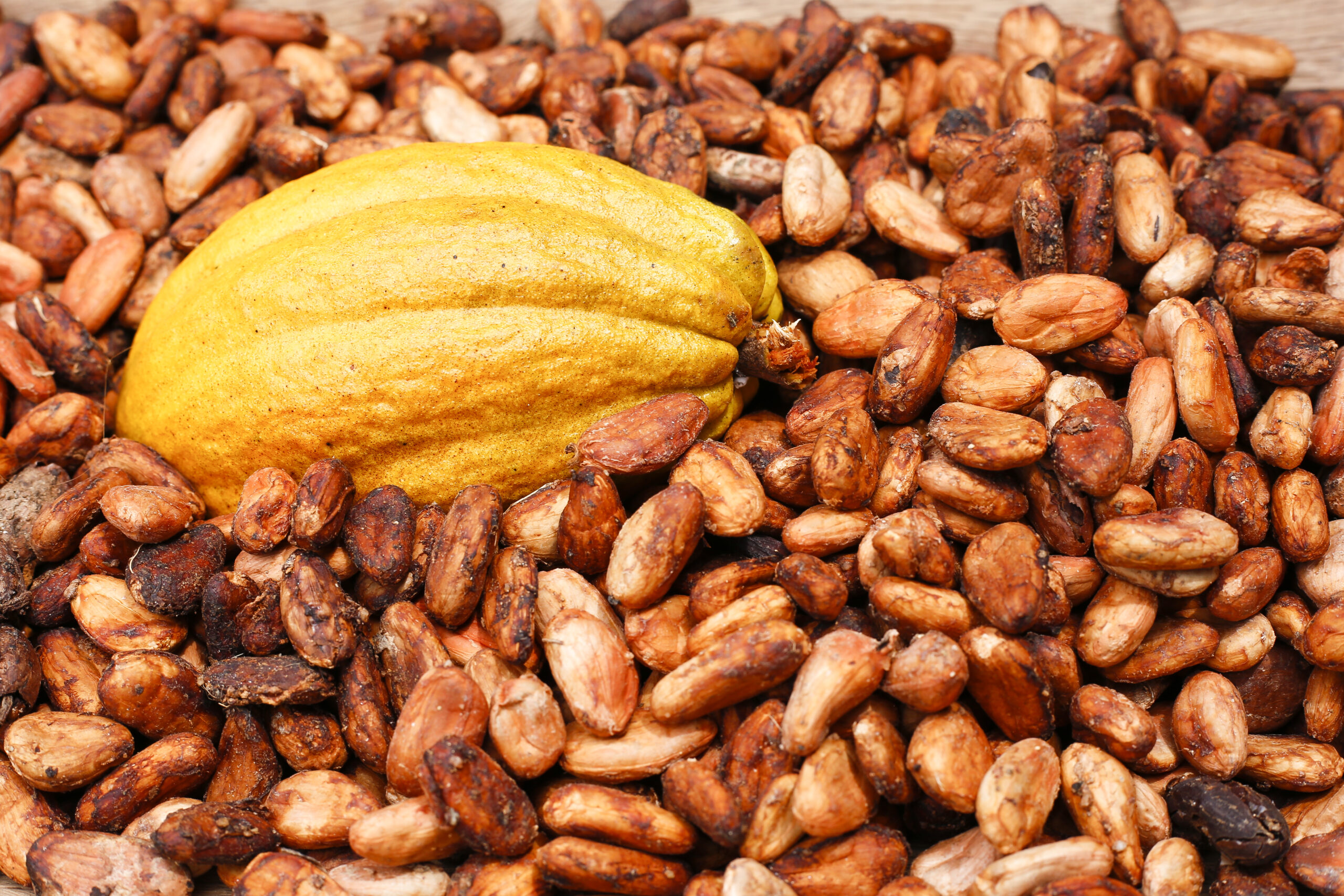
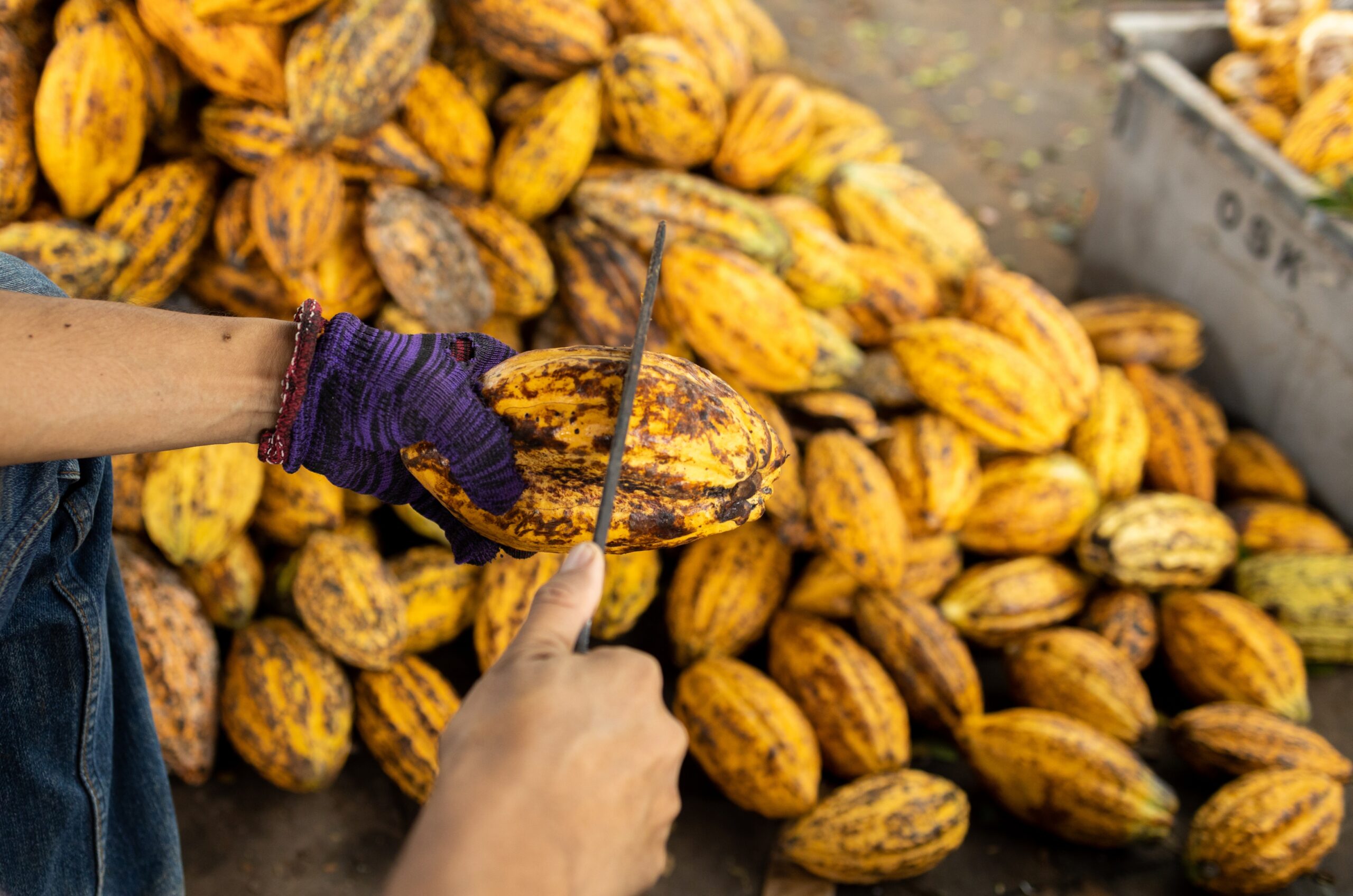

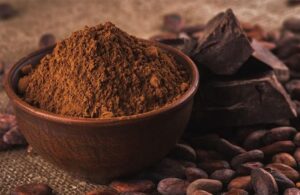
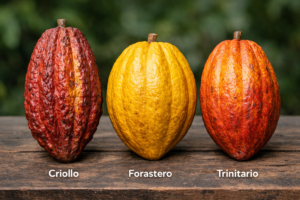

One Response
Cool Post.